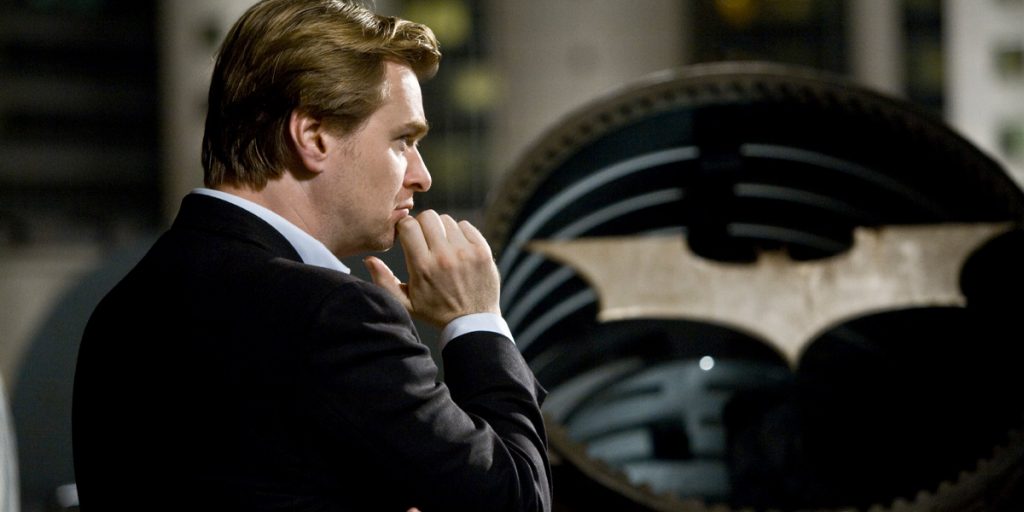The Dark Knight trilogy left an important legacy within the film industry that influenced how the comic book genre would be looked upon in years to come.
This article contains spoilers for Batman Begins, The Dark Knight, and The Dark Knight Returns.
When Christopher Nolan signed on to direct a new adaptation of the caped crusader in the early 2000s, he found the franchise on an all-time low, as the character had become a joke in the eyes of the public after the Joel Schumacher Batman films. Say what you will about Batman Forever or Batman & Robin – some love them as guilty-pleasures, others hate them – but they did lead us to a new era of comic book cinema by forcing filmmakers to take these stories more seriously. One of the many reasons why the character’s depiction on film decreased in quality during the 90s is because WB became obsessed with making an easier buck out of selling toys to children, rather than giving them good stories to be wrapped up about.
That is why there are so many colorful and shiny gadgets in the Schumacher films, including the infamous Bat-credit card: to sell toys. A character that used to inspire fear on criminals suddenly went out ice-skating against his enemies. Not that a silly Batman is unheard of: Adam West (Family Guy) excelled at giving us that iteration of the hero in the 60s. But going from Tim Burton’s gothic Batman Returns, where the Penguin (Danny DeVito, Dumbo) is biting people’s noses off, to a Bat-suit with nipples was quite jarring to say the least. Enter Nolan, who revolutionized the genre with his groundbreaking take on the classic hero as he chose a gritty, more realistic approach to Gotham and took the character back to his darker roots with Batman Begins.
BATMAN BEGINS (2005)
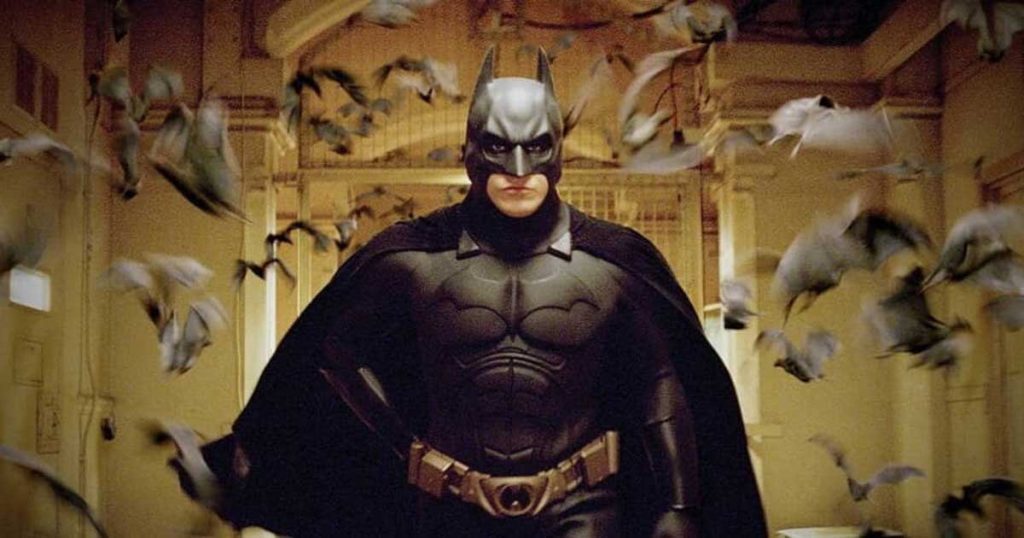
In a time where superhero movies weren’t being regarded with as much respect as they are today, with the exception of a few X-Men movies and Sam Raimi’s Spider-Man trilogy, it’s a miracle that we got a film like Batman Begins back in 2005. A story about fear, revenge and coming to terms with one’s own past, Nolan’s first entry in his superhero trilogy is a smart deconstruction of what we expect from the hero’s journey. After witnessing the murder of his parents when he was a child, billionare playboy Bruce Wayne (Christian Bale, Thor: Love & Thunder) relocates to Asia where he is trained to become an assassin by a member of the league of shadows, Ducard (Liam Neeson, The Ice Road), later revealed to be Ra’s al Ghul. Bruce disagrees with their violent ways and returns to Gotham, where he decides to become the vigilante known as Batman in order to protect the city from criminals.
The journey Bruce undergoes in this film is unlike anything we had seen in the genre back in the day. Sure, we had Spider-Man, who shared quite a similar origin story, and Batman had been portrayed in television and film way before Nolan ever got his hands on the character. What made Batman Begins stand out, though, is how it didn’t feel like a huge blockbuster. Yes, the action set pieces are still there, and there are characters running around in silly costumes, but these comic book personas are brought down to a much more human level in this movie. They’re not one dimensional caricatures: they are complex, unique, and fully realized characters.
Bale captures what it feels to grow into an adulthood filled with rage, confusion, and not being able to control your emotions in such a relatable manner. His performance immediately pulls you in and places you in Bruce’s shoes, which can’t be said about every actor who’s played the caped crusader before Nolan’s adaptation. Often, we see how superheroes are portrayed in a very positive note, which leaves for little to no grayness within their characterizations. Batman Begins slightly turns this on its head by making Bruce sort of unlikable in the film’s first act. Of course, you sympathize with the trauma he endured as a young child, but Nolan and David S. Goyer’s script challenges the audience by making us see him grow into a resentful and vengeful man. He’s not perfect, he’s constantly getting himself into fights and has gotten close to killing other men. It’s not until he leaves Gotham to figure out what he actually wants to do with his life where we begin to care for him. His yearning for revenge turns into wanting to bring justice to his corrupt city, taking his first steps in his journey.
Again, Nolan’s depiction of Batman didn’t create these classic superhero tropes, but he did reinvent them in a much more grounded way. Take Robert Downey Jr. ‘s Tony Stark in the first Iron Man. He too goes through a version of the hero’s journey, but his likable douchebag personality doesn’t ever change, and it remains like that until his last appearance as the character in Avengers: Endgame. Bale’s Bruce Wayne, on the other hand, is transformed by his own actions and decisions by the end of his first film. There’s a cut-clear character arc where Batman is our protagonist’s real identity, while Bruce Wayne becomes the mask. This has been captured in the comics time and time again, but not as strongly in film until Batman Begins.
THE DARK KNIGHT (2008)
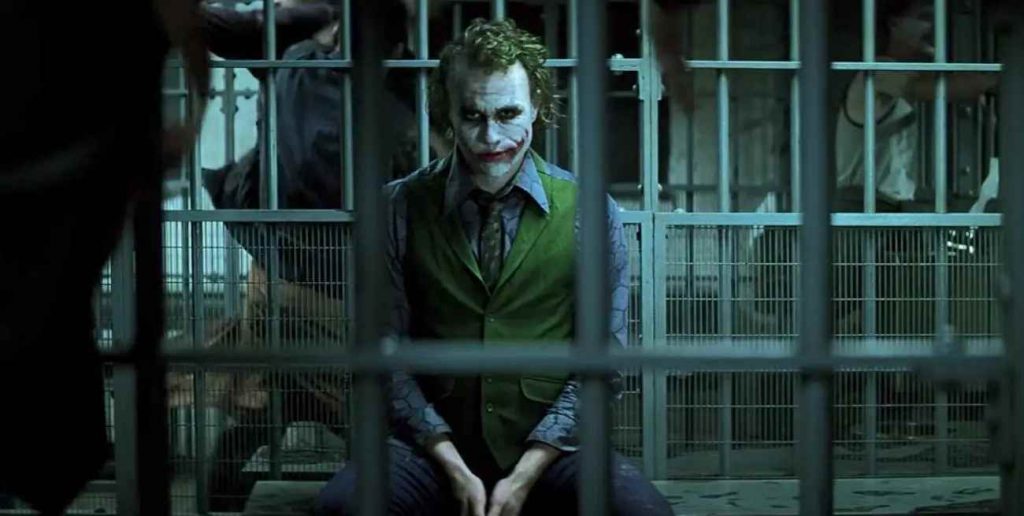
One of the few sequels we can call an improvement on its predecessor in almost every way, The Dark Knight is an astonishing storytelling achievement. Even though Batman Begins feels grounded in reality while still celebrating the genre, its sequel takes it to the next level by abandoning any comic book tropes left in Begins and embracing the elements of a crime drama alá Michael Mann’s Heat. After the events of Batman Begins, Bruce, Gordon (Gary Oldman, Mank) and new district attorney Harvey Dent (Aaron Eckhart, Wander) have successfully worked together to bring down some of Gotham’s most notorious criminals. That is until a new threat terrorizes the city in the form of an insane criminal who goes by the Joker (Heath Ledger, Brokeback Mountain).
If Batman Begins is the exploration of the hero’s journey, The Dark Knight is interested in challenging what it takes to remain a good man in a world that is constantly trying to bring you down. This is portrayed best in the storylines Bruce and Harvey are forced to undergo. Bruce is seen trying to leave his life as a vigilante behind in exchange for a normal one with Rachel (Maggie Gyllenhaal, Best Summer Ever), while Harvey is attempting to do the right thing despite his patience constantly being put to the test. Going into the film as a DC comic book fan, you know Harvey Dent will eventually turn into the villain known as Two-Face, but the way Nolan carefully handles this transformation through the Joker’s manipulations still manages to surprise you once it happens. On top of an amazing script and Nolan’s eye for building tension, Heath Ledger does a lot to help these themes and ideas come to fruition. From the way he talks to his mannerisms, he crafted a terrifying villain that kept you guessing. You can totally picture somebody like him manipulating good men like Dent into feeding their worst human traits. Paired with Bale’s Batman, who remains Gotham’s hero despite losing the love of his life at the hands of the Joker’s games, it all makes for an incredible crime drama that you often forget is supposed to be a superhero movie.
I believe what makes The Dark Knight standout amongst such a diverse genre has got to be its outstanding script. Normally with superhero movies, there’s that iconic action set piece that steals the entire show, distracting you from how good the rest of the story and characters are. In The Avengers, you remember the iconic 360 shot of the team coming together for the first time in the film’s third act, or the train sequence in Spider-Man 2. The Dark Knight has unforgettable action scenes like those mentioned as well: take the chase scene halfway through the film between Batman and the Joker as an example. But these scenes are not what you take away with you once the credits are rolling. Arguably the film’s most iconic moment is not an action-packed set piece, but it’s a scene with two people talking to each other in an interrogation room. Watching the Joker and Batman have a battle of ideologies is much more entertaining and engaging to see as an audience member because, again, the script is so incredibly tight. From the situations these characters find themselves in to the way these people interact with one another, it all builds up to thematically rich stakes and motivations that no action set piece could replicate.
THE DARK KNIGHT RISES (2012)
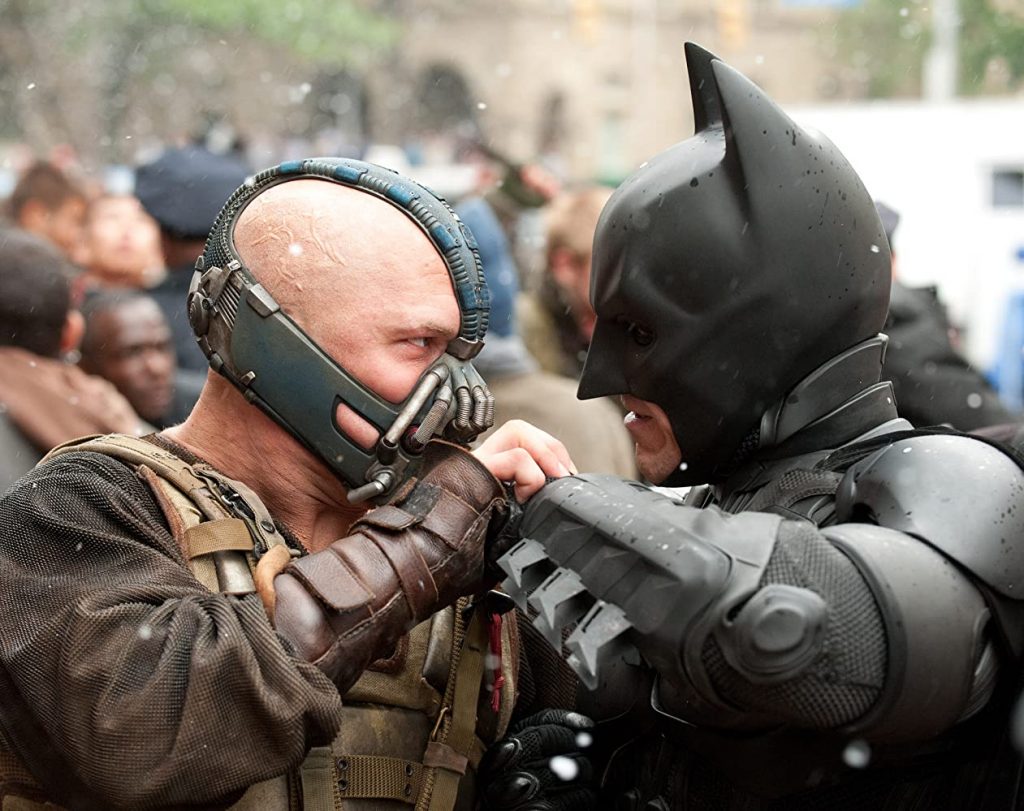
It’s rare to see a director get the opportunity to start and close a trilogy from beginning to end. It’s even rarer to see a good third installment in a franchise that wraps up the storylines building over the course of three films in a meaningful and satisfying way. Viewed by many as Christopher Nolan’s weakest work, The Dark Knight Rises is a solid end to a phenomenal trilogy that, all things considered, should’ve had a fantastic conclusion. Eight years after the Joker’s attempts to bring chaos upon Gotham, with Batman taking the blame for Dent’s crimes in the process, Bruce Wayne is forced to come out of retirement and wear the cowl one more time to assist the city in their fight against a new threat, a mercenary called Bane (Tom Hardy, Venom: Let There Be Carnage) who seeks to take control over Gotham and expose the city’s deepest, darkest secrets.
The Dark Knight Rises is a weird movie because, although there’s clearly a lot of passion behind it, it doesn’t come together as tightly as Batman Begins or The Dark Knight. The film’s themes and character work is just as good here as it’s ever been, especially in how it handles Bruce and Gordon’s closing chapters. Unfortunately, this is one of those cases where the plot hinders the movie’s momentum. There’s so much going on in this script, so many characters to keep track of that don’t have a real impact on the story, subplots on top of subplots, and it’s not done in an organic way. As a result, you lose interest because what’s great about the film gets lost with all the baggage it’s carrying.
Not everything lands on a negative note, though, as Nolan keeps demonstrating he’s a madman behind the camera by crafting what I believe is a masterful first act. Right off the bat, no pun intended, we get a sense of what’s at stake here: Gotham itself. Very early on, is it established that Gotham hasn’t been the same since the events from The Dark Knight. Sure, there’s been peace and tranquility for eight years, but peace that is based on a lie. This is best represented through James Gordon’s internal struggles, as he is tired of pretending Harvey Dent is the hero who saved the city, when in reality it was Batman who stopped him from killing his family during Harvey’s killing spree. In a way, throughout all three films, Gordon presents Gotham’s potential of doing good, yet his decision to lie to the city has come at a great price. People are praising a murderer rather than their true hero, leaving the door open for somebody as ruthless as Bane to show the citizens of Gotham its city’s true colors.
Tom Hardy’s performance as the villain never reaches the heights of Heath Ledger’s work, nor is it trying to, but the physicality he brings to the role immediately makes you understand this is a character to be afraid of. If the Joker was the perfect villain to challenge Batman’s ideology, Bane is the perfect villain to challenge our hero on a physical level. Up to this point, nobody has really been a physical threat to Batman in Bale’s filmography as the character, which made him seem unstoppable. So, seeing how Bane is able to go toe-to-toe with Bruce to the point of breaking his back during their first encounter, it definitely raises the stakes and makes the audience question if our beloved hero will make it out alive from this one.
As great of a villain Hardy brings to life, this is one of the film’s biggest problems: he doesn’t get to be the main antagonist. If anything, he only gets to play second fiddle. As it’s revealed to us literally 20 minutes before the movie comes to an end, the actual mastermind behind Gotham’s demise was actually Miranda Tate (Marion Cotillard, Annette), an associate to Wayne industries whose real name turns out to be Talia and is the secret daughter of Ra’s al Ghul. This automatically undermines any tension built between Bane and Batman, since the film is suddenly more interested in making a direct connection to the first villain in this trilogy, rather than doing its own thing. What makes it even more frustrating is how The Dark Knight Rises already had a great connection to Ra’s al Ghul’s past by making Bane an excommunicado of the league of shadows. It makes sense, it feels like a natural progression within the story, and it’s a great way to bring everything together. If Talia was set up as the main antagonist from the very beginning maybe this idea would have worked, considering this storyline has been told in the comics. Unfortunately, that just isn’t the case, making for an even more convoluted, lackluster third act.
On top of that, it doesn’t help that the second half of The Dark Knight Rises feels unfocused. Gotham falls into the hands of Bane, yet you don’t really care that it is happening. It goes for far too long and it wastes so much time with side characters that won’t have much to do afterwards. It is a pity because the cast does try to do their best with what they have. Blake (Joseph-Gordon-Levitt, Mr. Corman) and Selina Kyle (Anne Hathaway, Locked Down) in particular are welcomed additions with their characters being well written so that you want to know what will happen to them next. Levitt’s Blake makes for a great challenge for James Gordon and his thought process regarding the lies about Dent, while Selina plays an unlikely heroine who you don’t know if you should trust or not. Her relationship with Bruce, though short and not really developed, is by far the most fascinating one he’s had in the trilogy. You buy that these two would be attracted to one another, even learn to care for each other, despite being an invincible barrier separating them. It’s a shame the film isn’t really interested in exploring the relationship and spends time on useless characters like the one Ben Mendelsohn (Cyrano) plays, who ends up adding absolutely nothing to the overall narrative.
Alright, negativity out of the way, let’s talk about the one consistent thing about these movies: Bruce Wayne’s character arc. Batman Begins saw him discovering what he wants to do with his life and resources, The Dark Knight has Bruce yearning for a life outside of his cave, both literally and figuratively, and it’s only natural that The Dark Knight Rises would portray him as a broken man who’s lost the one thing dear to him, making him believe his life behind the mask is all he has left. That is why when Bane breaks his back and imprisons him in the hellish prison he’s put in, it makes for such an emotionally compelling closing chapter. This trilogy began with Bruce as a child falling down a pit and being rescued by his father, it is fitting that his story ends with him rising from another dark pit where he has to climb out by himself with nobody’s help.
Paired with his “sacrifice” where he saves Gotham from imminent destruction, the film manages to pull through and deliver a satisfying and meaningful conclusion that is character focused, despite its flaws that prevent it from being a great movie. Many fans since its release have debated whether or not The Dark Knight Rises earns its fake-out death involving Bruce, but in my opinion it is an amazing way to give the caped crusader a well deserved happy ending while ensuring somebody else will continue to wear the cowl, such as Nolan hinting Blake will carry on the mantle, with hope living on.
THE DARK KNIGHT TRILOGY’S LEGACY
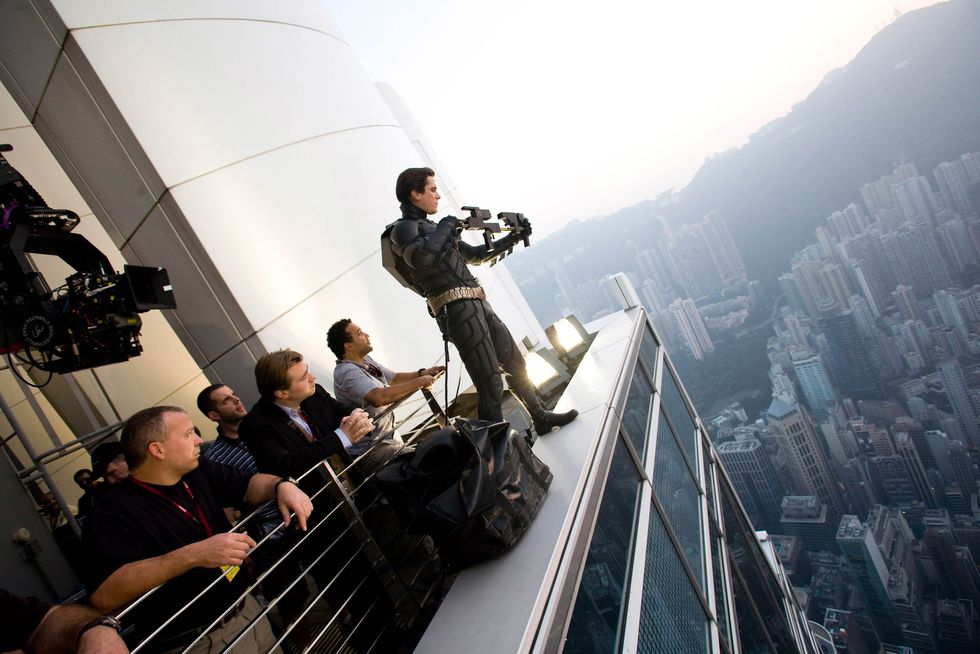
Today, audiences have grown tired of origin stories that take us through your typical motivations that inspire our heroes to fight against crime. Most recently, Tom Holland’s Spider-Man, for example, skipped his origin story in the MCU because people simply didn’t want to see uncle Ben die on the big screen again. In my opinion, this is one of many reasons why the first two solo films in Holland’s run as the character aren’t as memorable, because you don’t have a strong connection behind his motivations to be a superhero beyond the fact that it’s the right thing to do.
It’s not until Spider-Man: No Way Home that we see this arc, giving us that emotional connection of Peter Parker suffering a personal loss, pushing him to want to do good. Argue all day long about how overused these clichés have grown, but they are overused for a reason, because they work. Despite audiences sharing a distaste towards origin stories nowadays, one thing can’t be denied, The Dark Knight trilogy can be considered a milestone in the way it utilized and reinvented these tropes, making people realize these movies aren’t just live-action Saturday morning cartoons, but can be incredibly compelling dramas with complex characters and Oscar worthy performances.
Speaking of Oscars, did you know that the Academy Awards used to nominate a maximum of five films for Best Picture before 2010? How is this relevant to Batman? Well, because The Dark Knight being snubbed from a Best Picture nomination back in 2009 sent waves of outrage amongst cinephiles and filmmakers alike. War movies, biopics, and period dramas are usually the kind of films the Academy likes to celebrate and give the statue to. So, I don’t think nobody was expecting Nolan’s groundbreaking Batman sequel to win the award, no matter how great the film is, but the fact that it didn’t even get a nomination was enough to cause a change within the system.
The Academy later on announced they would open up the category for up to ten films to get the opportunity to be nominated. They announced this as a way to go back to the golden age of Hollywood where a wide range of movies competed for the grand prize, but we all know it was really the backlash involving The Dark Knight that forced them to make the change. The following year, animated features like Pixar’s Up, and sci-fi epics like James Cameron’s Avatar and District 9 made the cut for the category of Best Picture, and ever since then we’ve seen a few more blockbusters be recognized for the great stories they too can tell.
From a technical point of view, Christopher Nolan’s trilogy is as perfect as it can get. Its art direction is simple, yet beautiful to look at. Nolan’s decision to shoot both The Dark Knight and The Dark Knight Rises in IMAX proved superhero movies could also compete with other dramas on a visual level, as well as demonstrate the format could be a legitimate tool for filmmakers to come. Before The Dark Knight trilogy, IMAX screens were typically used for documentaries, but Christopher Nolan’s comic book epic was the first Hollywood production to utilized IMAX 15/70 cameras for nearly 30 minutes of run time, leading to entire films being shot in this format such as Avengers: Endgame and The Suicide Squad. Without Nolan’s support for this filmmaking technique, perhaps other visionaries like Denis Villeneuve wouldn’t have been able to bring something like Dune and its world to life.
As a result of being such a great trilogy, it comes to nobody’s surprise that these movies would go down to inspire a new generation of gritty reboots, remakes, sequels, and how to approach the genre. Take Sam Mendes’ Bond film Skyfall as an example. From the way it brings its titular character down to earth to the way Javier Bardem’s villain is written as this master of chaos, it is all so clearly inspired by Nolan’s groundbreaking work in his Batman trilogy. Also, probably the most notable movie that is a direct result from The Dark Knight has got to be Zack Snyder’s Man of Steel. Love it, hate it, it is a darker take on the character that attempts to do for Superman what Nolan did for Batman.
Tone is probably the one thing that distinguishes comic book movies from each other. You know exactly what you’re getting with an MCU film, a fun time with colorful characters. The Dark Knight, although a sequel, makes it very clear it’ll be a different movie compared to Batman Begins. It’s haunting opening sequence at the bank with the Joker tricking his goons into doing his dirty work only to kill them afterwards has not only become iconic, but establishes the darker tone it’s going for. Many films since then have tried to copy what Nolan achieved with his compelling sequel, with most people missing the point of the movie. The Dark Knight and its tone works because it had that setup in Batman Begins where the rules of this world have been established, allowing the franchise to become a character study in a more psychological manner. James Mangold’s chilling final chapter in Logan gave Hugh Jackman the opportunity to depart the role of Wolverine in such a good fashion just like Nolan did with Bale years before it. Though a very different film, taking more inspiration from westerns, Logan rides on what The Dark Knight trilogy had accomplished, making people take these movies as genuine dramas.
This year Matt Reeves will treat us with his own rendition of the caped crusader with The Batman, as Robert Pattinson embraces the role. How will it differ from past adaptations? We won’t have to wait long to figure that out for ourselves. Looking back, though, we’ve come a long way from the comic strips and now we are currently living in the renaissance of superhero movies. The genre has never been bigger and more successful than it is today. People often forget these movies didn’t always make a billion dollars at the box office. It took several films to break the misconceptions that comic book movies were strictly for children, and Christopher Nolan’s The Dark Knight trilogy played a pivotal role in changing the tide in this conversation, amongst other films, whose influence on the comic book world can still be seen to this day.
The Batman will be released in theaters everywhere on March 4, 2022.

